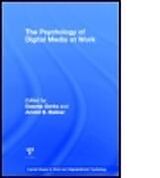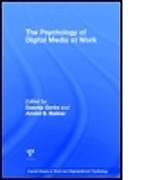The Psychology of Digital Media at Work
Einband:
Fester Einband
EAN:
9781848720749
Untertitel:
Englisch
Genre:
Psychologie & Esoterik
Autor:
Daantje Bakker, Arnold Derks
Herausgeber:
PSYCHOLOGY PR
Auflage:
New.
Anzahl Seiten:
192
Erscheinungsdatum:
29.11.2012
ISBN:
978-1-84872-074-9
Zusatztext "Editors Derks and Bakker (both Department of Wortk and Psychology! Erasmus Univ.! the Netherlands) provide an overview of the evolution of digital media in the workplace in their introduction to this volume! which is part of the "Current Issues in Work and Organizational Psychology" series...This volume provides practical research results and guides for utilizing online tools in the workplace... Summing Up: Recommended" - N.J. Johnson! formerly! Metropolitan State University! for CHOICE! September 2013"This timely collection highlights current concerns about the psychology of digital media use in the workplace - from email to social networks! from computer games to video conferencing! and from corporate training to surveillance. Each case study raises the question whether our high expectations about networked and mobile computing are over-hyped or justified! and how they impact work-life balance and productivity." - Peter Krapp! University of California! Irvine! USA Informationen zum Autor Daantje Derks is an Assistant Professor at the Department of Work and Organizational Psychology at Erasmus University Rotterdam, the Netherlands. Her current research interests focus on the impact of computer-mediated communication on daily work life. Arnold B. Bakker is a Full Professor at the Department of Work and Organizational Psychology at Erasmus University Rotterdam, the Netherlands. His research interests include positive organizational behavior (e.g., flow and engagement at work, performance), burnout, crossover of work-related emotions and serious games on organizational phenomena. Klappentext The central theme of this book is how new media affect organisational behaviour and employee well-being. It will be essential reading for students of organisational psychology and related disciplines. Zusammenfassung The central theme of this book is how new media affect organisational behaviour and employee well-being. It will be essential reading for students of organisational psychology and related disciplines. Inhaltsverzeichnis Derks & Bakker, The psychology of digital media @ work: Introduction. PART 1: ONLINE COMMUNICATION AND COLLABORATION Rennecker & Derks, Email overload: Fine-tuning the research lens. Rennecker & Derks, Online Social Network in the Work Context. Jarvenpaa & Hedlund, Mobilizing Knowledge Collaboration: Today's reality vs. Future possibility. Krumm & Hertel Knowledge, Skills, Abilities and Other Characteristics (KSAO's) for virtual teamwork. PART 2: GAMING AND ONLINE TESTS Xanthopoulou & Papagiannidis Games-Work Interaction: The beneficial impact of computer games on work behaviors. Korteling, Helsdingen & Theunissen Serious gaming @ work: Learning job-related competencies using serious gaming. van der Klink, Drachsler & Sloep Technology-enhanced learning in the workplace. Oostrom, Born & van der Molen Webcam tests in personnel selection. ...
"Editors Derks and Bakker (both Department of Wortk and Psychology, Erasmus Univ., the Netherlands) provide an overview of the evolution of digital media in the workplace in their introduction to this volume, which is part of the "Current Issues in Work and Organizational Psychology" series...This volume provides practical research results and guides for utilizing online tools in the workplace... Summing Up: Recommended" - N.J. Johnson, formerly, Metropolitan State University, for CHOICE, September 2013 "This timely collection highlights current concerns about the psychology of digital media use in the workplace - from email to social networks, from computer games to video conferencing, and from corporate training to surveillance. Each case study raises the question whether our high expectations about networked and mobile computing are over-hyped or justified, and how they impact work-life balance and productivity." - Peter Krapp, University of California, Irvine, USA
Autorentext
Daantje Derks is an Assistant Professor at the Department of Work and Organizational Psychology at Erasmus University Rotterdam, the Netherlands. Her current research interests focus on the impact of computer-mediated communication on daily work life. Arnold B. Bakker is a Full Professor at the Department of Work and Organizational Psychology at Erasmus University Rotterdam, the Netherlands. His research interests include positive organizational behavior (e.g., flow and engagement at work, performance), burnout, crossover of work-related emotions and serious games on organizational phenomena.
Klappentext
The central theme of this book is how new media affect organisational behaviour and employee well-being. It will be essential reading for students of organisational psychology and related disciplines.
Inhalt
Derks & Bakker, The psychology of digital media @ work: Introduction. PART 1: ONLINE COMMUNICATION AND COLLABORATION Rennecker & Derks, Email overload: Fine-tuning the research lens. Rennecker & Derks, Online Social Network in the Work Context. Jarvenpaa & Hedlund, Mobilizing Knowledge Collaboration: Today's reality vs. Future possibility. Krumm & Hertel Knowledge, Skills, Abilities and Other Characteristics (KSAO's) for virtual teamwork. PART 2: GAMING AND ONLINE TESTS Xanthopoulou & Papagiannidis Games-Work Interaction: The beneficial impact of computer games on work behaviors. Korteling, Helsdingen & Theunissen Serious gaming @ work: Learning job-related competencies using serious gaming. van der Klink, Drachsler & Sloep Technology-enhanced learning in the workplace. Oostrom, Born & van der Molen Webcam tests in personnel selection.

Leider konnten wir für diesen Artikel keine Preise ermitteln ...
billigbuch.ch sucht jetzt für Sie die besten Angebote ...
Die aktuellen Verkaufspreise von 6 Onlineshops werden in Realtime abgefragt.
Sie können das gewünschte Produkt anschliessend direkt beim Anbieter Ihrer Wahl bestellen.
Loading...
Die aktuellen Verkaufspreise von 6 Onlineshops werden in Realtime abgefragt.
Sie können das gewünschte Produkt anschliessend direkt beim Anbieter Ihrer Wahl bestellen.
| # | Onlineshop | Preis CHF | Versand CHF | Total CHF | ||
|---|---|---|---|---|---|---|
| 1 | Seller | 0.00 | 0.00 | 0.00 |
